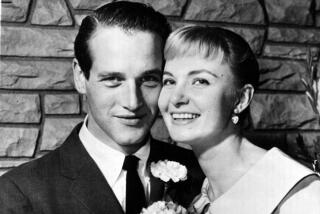The poet lives as he loved: ‘as variously as possible’
Digressions on Some Poems
by Frank O’Hara
A Memoir
Joe LeSueur
Farrar, Straus & Giroux: 306 pp., $25
*
“It was, of course, my attachment to Frank that ruled out my forming a lasting romantic relationship with my boyfriends -- his presence in my life was that encompassing,” Joe LeSueur declares toward the close of this eloquent memoir of Frank O’Hara, the New York scene-maker, art curator, poet and bon vivant who, since his death after being hit by a dune buggy on Fire Island in 1966, has gone from cult figure to canonical one. Scarcely alone in feeling “encompassed” by O’Hara, LeSueur was for 9 1/2 years the poet’s roommate and sometimes bedmate. Although never an official lover (O’Hara would doubtless have disparaged the currently popular weasel-word “partner”) he was, as they say in “Double Indemnity,” “closer than that.”
The movies were an inspiration to O’Hara, who opened one poem with the line “How funny you are today New York / like Ginger Rogers in ‘Swingtime.’ ” Today traffic in the cinematic is the sine qua non of postmodernism. In the ‘50s, the thought that anyone would have friends over for dinner to watch “Gold Diggers of 1933” on television marked one’s interest as “camp.” Now O’Hara’s puckish wit and his insistence that capturing everyday experiences like taking a walk (“A Step Away From Them”) or taking a bath (“Embarrassing Bill”) is the poet’s prime vocation has enhanced his reputation to a level that threatens to eclipse that of his more sober-sided friend John Ashbery.
LeSueur (who died in 2001 shortly after completing this book) uses several O’Hara poems as starting points for talking about the man in a way that’s obviously different from what he calls “the cold, deadly account of Frank’s life” in Brad Gooch’s massive “City Poet.” We learn for example that “Patsy [Southgate, the poet] wouldn’t have fallen in love with Mike [Goldberg, the painter], much less married him, if his rough manner and bravado had not been offset by what his two gay friends [O’Hara and LeSueur] embodied.” For O’Hara was out of the closet in a way that wouldn’t become widespread until after Stonewall, a 1969 protest against a police raid on a club not all that different from the clandestine disco described in his poem “At the Old Place.”
Still, the book abounds with things that Will would never tell Grace. Like the way O’Hara would be “regularly making out with a guard at the UN during its construction, right there in the small, temporary station house, always after midnight.” LeSueur also writes of the comings and goings of O’Hara’s casual bedmates (LeRoi Jones before he became Amiri Baraka), several of whom he would sometimes share with LeSueur (Joe Brainard, J.J. Mitchell). Or that LeSueur once cavorted with Alger Hiss’ stepson, Timothy Hobson. And then there’s Bill Berkson, the completely heterosexual poet who was as much an inspiration to O’Hara as gay dancer Vincent Warren, the subject of some of the most beautiful love lyrics one man has ever written about another. For O’Hara, gay life wasn’t a tinny echo of straight ones but rather one in which we have the “grace to be born and live as variously as possible.” Those are his words, printed on his tombstone. And because of them, Frank O’Hara is still very much alive.
More to Read
Sign up for our Book Club newsletter
Get the latest news, events and more from the Los Angeles Times Book Club, and help us get L.A. reading and talking.
You may occasionally receive promotional content from the Los Angeles Times.








